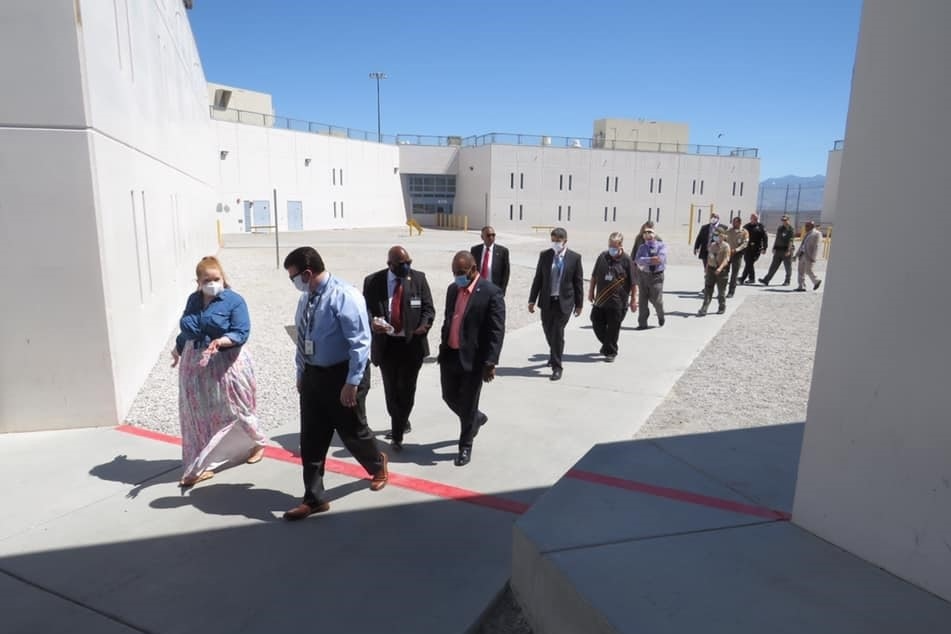
Nevada Prison System Audit Of Force Procedures Remains Unresolved Ten Months After It Was First Released
By TheNevadaGlobeStaff, January 14, 2023 1:22 pm
NEVADA – Ten months after a yearlong state audit uncovered major problems in Nevada’s prison system’s use of force procedures, officials with the state Department of Corrections have admitted that none of the report’s 16 suggestions to improve facility operations had been implemented.
Nonetheless, department officials informed state legislators last week that they had partially followed 14 recommendations, ranging from updating use-of-force data to removing unlicensed firearms.
The agency attributed the delays to long-standing staff shortages that have worsened over the last year.
The information came during a legislative subcommittee meeting on Thursday, which also happened to be Nevada Department of Corrections Director James Dzurenda’s fourth day on the job. The previous director, Charles Daniels, was asked to retire after the department experienced upheaval, including the escape of a convicted bomb maker from a Las Vegas-area prison.
Dzurenda formerly worked in the office of then-Gov. Brian Sandoval and was recently hired by Gov. Joe Lombardo’s administration to restore “some stability” to the correctional department, according to Ben Kieckhefer, the governor’s director of staff.
During his previous term, Dzurenda stated that one of his key priorities was to identify alternatives to the use of force by prison officials.
According to the March 2022 audit, use of force data was “not accurate, full, or dependable” and frequently overstated the number of events. It also discovered that junior prospective officers frequently lacked training for the responsibilities they performed, and that the inspector general’s office did not review two-thirds of a sample of excessive force grievances.
The audit also discovered that more than a quarter of the department’s 744 weapons were unlawful or outmoded, including 95 projectile launchers and 74 handguns that were either prohibited versions or manufactured by unapproved manufacturers. In addition, the agency spent nearly $200,000 on an unimplemented body camera program.
Partially completing the suggestions frequently entailed training for improved procedures with no indication of full implementation.
For example, the agency has been teaching all 24 inspector general’s office staff members to submit grievance complaints into the state system, which the audit discovered was frequently delayed. However, there was no evidence that the department had a method in place to expedite the evaluation of inmate grievances, which is the first stage in the legal process for inmates before they file a lawsuit.
There has been some training for safely disposing of old firearms from correctional facilities, but it is “insufficient un the absence of a process in place.”
In addition, the prisons department indicated that the Legislative Counsel Bureau’s Fiscal Analysis Division is nearing completion of a contract with Motorola for up-to-date body cameras, which may happen as early as this month.
Two recommendations have yet to be implemented. One is to gather, evaluate, and report event data as needed to aid with resource allocation and training. The other is to oversee all use-of-force training and ensure that it corresponds to the weaponry assigned to the facilities.
The suggestions have not been fully followed, according to Deputy Director of Operations William Gittere, who served as interim director before Lombardo selected Dzurenda, because of personnel shortages that “have reached pretty much one in three officers.”
As a result, he stated that the department’s priority has been on immediate needs such as prisoner and general public safety.
“That’s not an excuse,” Gittere said, adding that Dzurenda’s return to the agency should aid in the implementation process.
Recent complaints have included occurrences involving the use of force. Over two dozen convicts at Ely State Prison went on hunger strike last month owing to concerns about food quality and amount levels, as well as an overall lack of humane circumstances at the maximum-security facility.
Advocates have made many concerns about the use of force, including an end to what they describe as retaliation against inmates who register complaints and a halt in processing grievance forms.
Credits: MyNews4
Copyright 2022 775 Times, NV Globe. All rights reserved.




